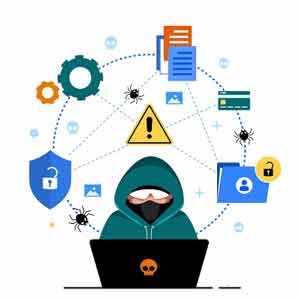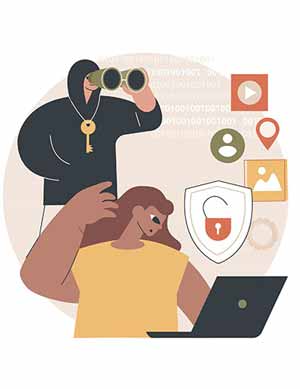What is cyberbullying
- December 13, 2022
- Posted by: admin
- Category: Information Security
What is cyberbullying?
Cyberbullying is the use of electronic communication to bully a person, typically by sending messages of an intimidating or threatening nature. It can include sending abusive or hurtful text messages, emails, or social media posts, making inappropriate comments on someone’s profile page, or creating a fake profile in order to embarrass or harass someone.
Cyberbullying can have a profound impact on a person’s mental and emotional well-being. The constant stream of hurtful messages can make someone feel isolated, anxious, and depressed. In extreme cases, it can lead to self-harm or even suicide.
If you are cyberbullied, you must reach out for help. Talk to a trusted adult about what’s going on, or contact a helpline such as the Cyber Cell of India or the local Police station. even we can help you out to get rid of the problem.

What are the negative impacts of cyberbullying?
There are many negative impacts of cyberbullying. Victims of cyberbullying can suffer from anxiety, depression, and low self-esteem. They may also have trouble sleeping, experience weight loss or gain, and have trouble concentrating in school. Cyberbullying can also lead to social isolation and suicide.
What are the penalties for cyberbullying?
Cyberbullying is a serious problem with real-life consequences. Penalties for cyberbullying can include school suspension, expulsion, and even criminal charges.
Cyberbullying is often done anonymously, making it difficult to track down the offender. However, if the cyberbully is identified, they may face serious penalties. Depending on the severity of the bullying, penalties can range from school suspension to expulsion to criminal charges.
Schools are taking cyberbullying seriously and are working to crack down on offenders. In some cases, schools have suspended or expelled students for cyberbullying. If your child is being bullied online, talk to their school about available options.
Criminal charges are another possibility for punishment if cyberbullying results in serious harm to the victim. In extreme cases, victims of cyberbullying have committed suicide. This is why it’s important to take any threat of suicide seriously and get help for the victim immediately. If you know someone who is being bullied online, don’t hesitate to ask for help.
What is the general objective of cyberbullying?
The general objective of cyberbullying is to harm or control another person through the use of technology. This can include sending mean or threatening messages, posting harmful or untrue information about someone, spreading rumors online, or purposefully excluding someone from an online group. Cyberbullying can have a serious impact on a person’s mental and emotional health, and can even lead to suicide. It is important to be aware of the signs of cyberbullying and to take action if you or someone you know is being bullied online.
How to trace an IP address in order to stop cyberbullying?
If you are being cyber-bullied, it is important to take screenshots or save any messages that you receive. This will be helpful evidence if you decide to report the bullying to law enforcement or to the social media platform where it is taking place.
In order to trace an IP address, you will need to obtain a subpoena from a court. Once you have the subpoena, you can then contact the internet service provider (ISP) who assigned the IP address and request information about the account holder. The ISP may require a law enforcement agency to make the request on their behalf.
If you are able to identify the person responsible for the cyber-bullying, you can then take steps to protect yourself and/or file a restraining order against them.
Can a cyberbully be arrested in India?
In India, cyberbullying is not explicitly illegal. However, there are several laws that can be used to prosecute perpetrators of online harassment. These include the Information Technology the Indian Penal Code, and the Juvenile Justice Act.
The Information Technology Act prohibits several activities, including hacking, publishing obscene material, and sending threatening messages. Under this act, cyberbullying can be prosecuted as an offense punishable with imprisonment of up to three years and/or a fine of up to Rs 5 lakh.
The Indian Penal Code contains a number of provisions that can be used to prosecute online harassment. These include sections 503 (criminal intimidation), 506 (criminal intimidation by an anonymous communication), and 509 (word, gesture or act intended to insult the modesty of a woman). These offenses are punishable with imprisonment of up to two years or with a fine or both.
The Juvenile Justice Act also contains provisions dealing with online harassment. Section 14 of the act prohibits child pornography and section 15 prohibits using children in sexual acts. These offenses are punishable with imprisonment of up to five years and/or a fine of up to Rs 10 lakh.
Can we take legal action against cyberbullying?
When it comes to cyberbullying, there is a lot of gray areas. What may be considered cyberbullying to one person may not be seen as such to another. This can make it difficult to take legal action against someone for cyberbullying.
There are, however, some instances where legal action can be taken. If the cyberbullying is severe and/or repeated, it may qualify as harassment or stalking. If threats of violence are made, it could be considered threatening or inciting violence. And if pornography or other explicit images are involved, it could be classified as defamation or libel.
If you are considering taking legal action against someone for cyberbullying, it is important to consult with an attorney beforehand. They will be able to advise you on what course of action may be best in your particular case.
How can cyberbullying be prevented?
There are a few key things that can be done in order to help prevent cyberbullying. First, it is important to be aware of what cyberbullying is and how it can manifest itself. This means being familiar with the various types of online platforms and how they can be used to bully others. It is also important to have a good understanding of your child’s online activity and who they are communicating with.
In terms of specific prevention strategies, parents and guardians should set clear expectations for their child’s online behavior. They should also closely monitor their child’s activity, including any social media accounts. If possible, it is helpful to keep communication lines open so that your child feels comfortable coming to you if they experience or witness any cyberbullying.
There are also a number of resources available to help victims of cyberbullying. These include hotlines, counseling services, and support groups. If you or someone you know is being bullied online, reach out for help from one of these organizations.


